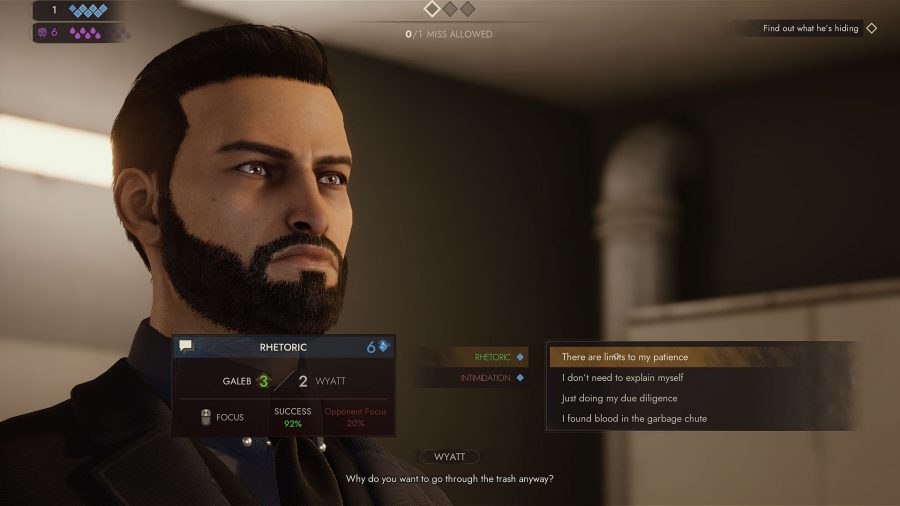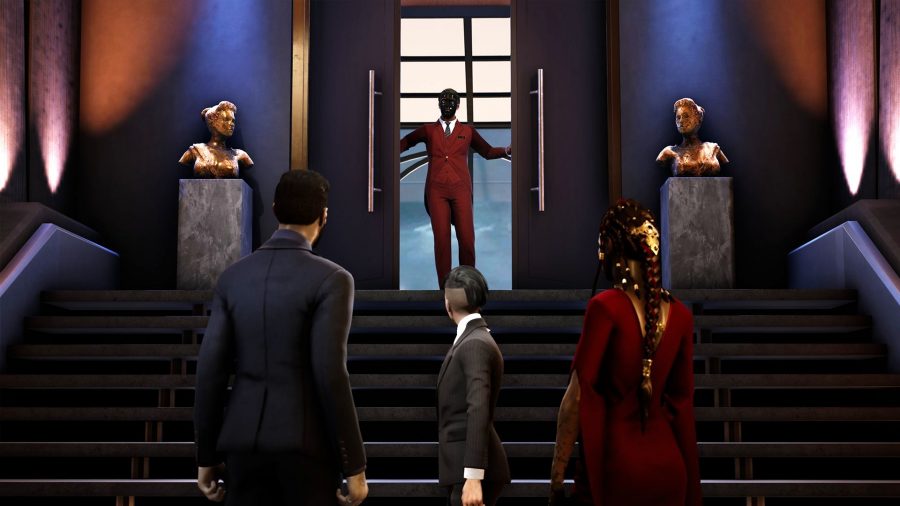Our review of Vampire: The Masquerade – Swansong begins with the title “Masquerade,” vampire society’s typically fancy term for the secret of their existence, at stake. Prince Hazel’s ruling sect of Boston’s Cabal has just declared a code red after attacking his loved ones at a downtown party, making it clear that someone wants to upset the status quo. Anarchists, a sect of vampires who refuse to live by the code of the civilized Camarilla? Some kind of internal deception? Competing organization?
To Bram Stoker, the vampire was a lonely womanizer, a squeaky but impeccably well-bred figure with a ruffled collar and cuffs. Count Dracula thinks only of fine taffeta, new pick-up lines, and pretty young women of high society, and he will last 20 minutes in this game before the Prince of the Camarilla stabs him.
The vampires in Vampire: The Masquerade are more like the undead Illuminati: yes, cold and calculating characters with fangs, but also minds full of machinations and political maneuvering. They pull the strings of our society, they control everything we do, our impact on the environment, our health. Because we are the walking blood sacs that they need to feed, and they must protect the Masquerade from us forever lest we hunt them to extinction.
It really is a fantastic setting for a game, and not just because of the nostalgia for VTM: Bloodlines. Originating from Mark Rein-Hagen’s 1991 tabletop RPG, The World of Darkness is rich in detail and gives you the same immersive experience as the first Matrix movie – seeing our familiar world in a completely different way. and much more sinister.
However, it takes some time to get there. It is a game with three main characters exchanging points of view between three vampires from Prince Hazel’s inner circle. Therefore, he accumulates an incredible amount of exposure before giving her an agency. It’s understandable: for newcomers to the world, you need to explain the concept, the rules of the vampire society, the code red that just happened, and then introduce the key character and establish his motivations. Three times in a row. That’s a lot to do during the game’s opening hour, yet you can’t help but think there’s a more elegant solution than the current thread.
Swansong’s Boston is decadent and callous, like Architectural Digest and Twilight in the best possible way.
Once you finally figure out where, when and why, you’ll be in charge of a detective game with RPG elements and interactive boss battles. It’s not too different from Big Bad Wolf Studio’s previous game The Council in that all the courtship intrigue and raised eyebrows are where the combat would normally take place. Environmental interactions are pretty sloppy, and if you want to be glib about it, I’d say it involves looking for “interaction” clues in each room, almost always shown on papers and boxes, and then moving on to the next area. . .
However, it becomes more poignant in conversations and when vampire powers are used. These give you access to additional senses, telling you where the character you’re tracking was, marking the presence of an illusion, hiding you from others. While these abilities don’t have a cooldown and you can walk around with them all the time if you want, contextual actions do cost points.

Let’s say you want to hack a computer, dominate a character in a conversation to bend them to your will, or use your education to better understand some piece of evidence you’ve found. You will need to spend points to make any of these items, and these points are doled out very sparingly. You can get one or two as a conversation reward or level up after a cutscene. It always seems like you don’t have enough funds to do what you want, especially in conversations where you can spend even more action points if your opponent also decides to “focus” and increase his social media skills. tool with which you try to overcome them. It’s probably good. Spending points seems significant, but it’s frustrating to leave gems unreturned for the sake of your budget.
There’s something about Swansong, the atmosphere, the depth of the fiction, that keeps you in the moment.
Emem, Galeb and Leisha are a worthy trio of leads, and Swan Song strikes a nice balance between giving you a clear idea of how they want to act and letting you choose their approach. My Emem is related to the skills of a detective, Leisha is physically typical, and Galeb is a master of all dark professions, and it depends on the points I spent on her skills. They may have completely different features in your game. However, Emem will remain a charming and outspoken conversationalist, Leisha will be a feisty mother, and Galeb will enjoy playing her in a Channel Five TV movie.
Over the course of several days in September 2019, the three receive harsh orders from Prince Hazel and become involved in a series of murders. Narrative-wise, it’s not particularly literary or deep, but it’s engaging and makes the most of the World of Darkness setting. It’s a decadent, emotionless place akin to the world of the new Hitman games, filled with mysterious super-rich who seem to have everything but live in personal poverty, and brought to life with fantastical interiors. It’s like Architectural Digest meets Twilight in the best possible way.

I don’t know what you’re talking about in this story. There are certainly big decisions, from the very first cutscene, and they have a ripple effect throughout the game, but I also failed once in a matchup and expected to pay the price with huge consequences. At the crime scene, I encountered a ghoul posing as a police officer who had recovered secret Camarilla documents and was about to share them with the police.
Thanks to my goofy debate skills, he stuck to his decision, but after being informed by HUD that I had failed the confrontation, I was given three consecutive conversation options with a 100% chance of overpowering my enemy and basically doing what i was trying. to do. all succeed together. Catastrophe averted, documents hidden, ghoul dispatched. What was then the bet of the confrontation?
It’s not particularly polished or beautiful. The interaction does nothing to promote story-based games as a genre. But there is something about “Swan Song”—the atmosphere, the depth of the fiction—that keeps you in the moment and makes it easy to forgive the superficial nature of what it demands of you from scene to scene.
Source : PC Gamesn


 245050
245050 245051
245051 245052
245052 245053
245053



